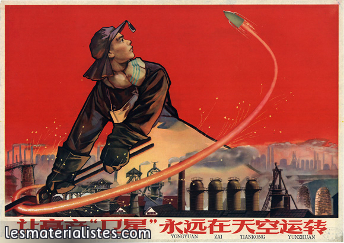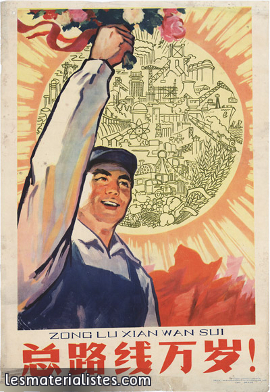Chinese people's communes - 6 : The problems of the leap
Submitted by Anonyme (non vérifié) The leap was unable to be satisfy the expectations of the Communist Party. The main problem was the terrible weather conditions, with droughts and flooding on a terrible scale, making agricultural production fall by14% in 1959 and by 13% in 1960. In 1961, production had gone back to the levels of 1952. The state had to buy grain on the international market, 5 million tons a year.
The leap was unable to be satisfy the expectations of the Communist Party. The main problem was the terrible weather conditions, with droughts and flooding on a terrible scale, making agricultural production fall by14% in 1959 and by 13% in 1960. In 1961, production had gone back to the levels of 1952. The state had to buy grain on the international market, 5 million tons a year.
This was not all. The USSR supported a revisionist fraction and ceased to help China, trying to break the anti-revisionist struggle launched by Mao Zedong. In 1960, from one day to another, 15 000 engineers and staff from the USSR left the country, destroying all the blueprints before leaving.
This meant, basically, that industry was ground to a halt, and fell by 38% in 1961, and then by 16% in 1962.

But there were also subjective errors, based on the same problem that affected the USSR in the beginning of the 1980's. The plan for the Great Leap Forward was, in its method, correctly based on dialectical materialism. Nevertheless, it separated the history of the humans from the movement of matter in general.
Therefore, voluntarism as a leftist trend was very strong, to try to compensate the problems that appeared. One example was that, as there was not enough science in the masses, the steel produced in the countryside was sometimes unusable. The huge mass mobilization couldn't compensate this.
Another example is very famous: the Four Pests campaign, against sparrows, rats, flies and mosquitoes. It was considered that these animals were in competition with humans and that their extermination would bring a situation of equilibrium in the production for humans, as it was calculated that rats were consuming 350 million kg of food, and each sparrow 3kg of grain. It was also a question of hygiene for the masses.
 Of course, it was a subjectivist error to separate these animals in an abstract way from the biosphere in general. Destroying the nests and scaring the birds (for example by banging pots and pans), was in fact paving the way for insects.
Of course, it was a subjectivist error to separate these animals in an abstract way from the biosphere in general. Destroying the nests and scaring the birds (for example by banging pots and pans), was in fact paving the way for insects.
Sparrows were replaced by cockroaches on the list, but this was too late and anyway the principle was the same. In considering that Man must conquer Nature, Mao Zedong followed the same erroneous path as in the USSR in the 1950's.
It had a sense to build and improve 85 million toilets, to dredge 1,6 million km of ditches, but the struggle against the animals was a non-understanding of the reality as a whole. The same problem happened indeed with massive deforestation, or with the massive trend to urbanization, with a city population growing up from 57 to 100 millions from 1949 and 1957.
There was planning, but it considered unilaterally the development of productive forces as necessarily positive in itself, and here it was following Stalin's mistakes, which consisted in forgetting the existing contradictions, mainly between town and country, and between manual and intellectual labour.
Mao Zedong understood this, but the situation was already difficult. In April 1959, he had to step down as Chairman of the People's Republic of China, to be replaced by the rightist Liu Shaoqi.
During summer of the same year, Mao also faced an attempted coup by Defense Minister Peng Dehuai, who was defeated. But still, it marked the rise of Deng Xiaoping, famous in 1962 for his consideration about agriculture that: “It doesn't matter whether it's a white cat or a black, I think; a cat that catches mice is a good cat.”
There were two lines, with Mao on one side, Liu Shaoqi and Deng Xiao Ping on the other. The clash was inevitable, and therefore Mao called for the Great Cultural Proletarian Revolution.
